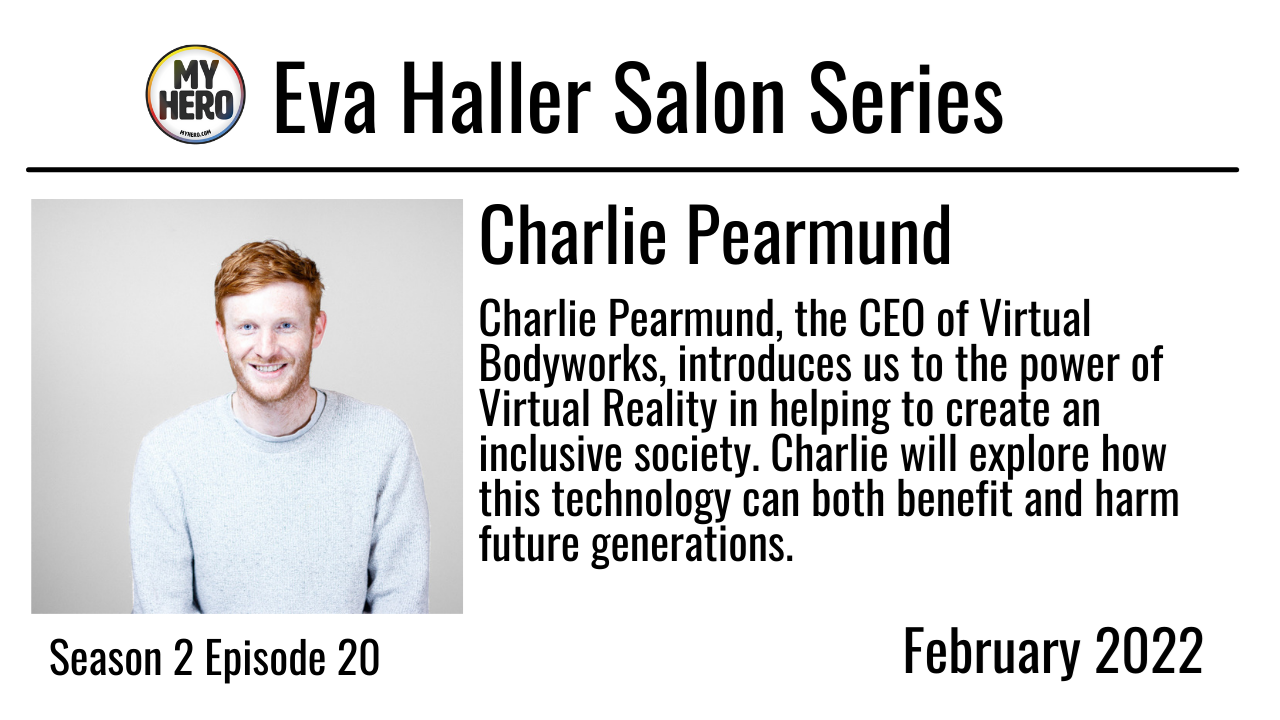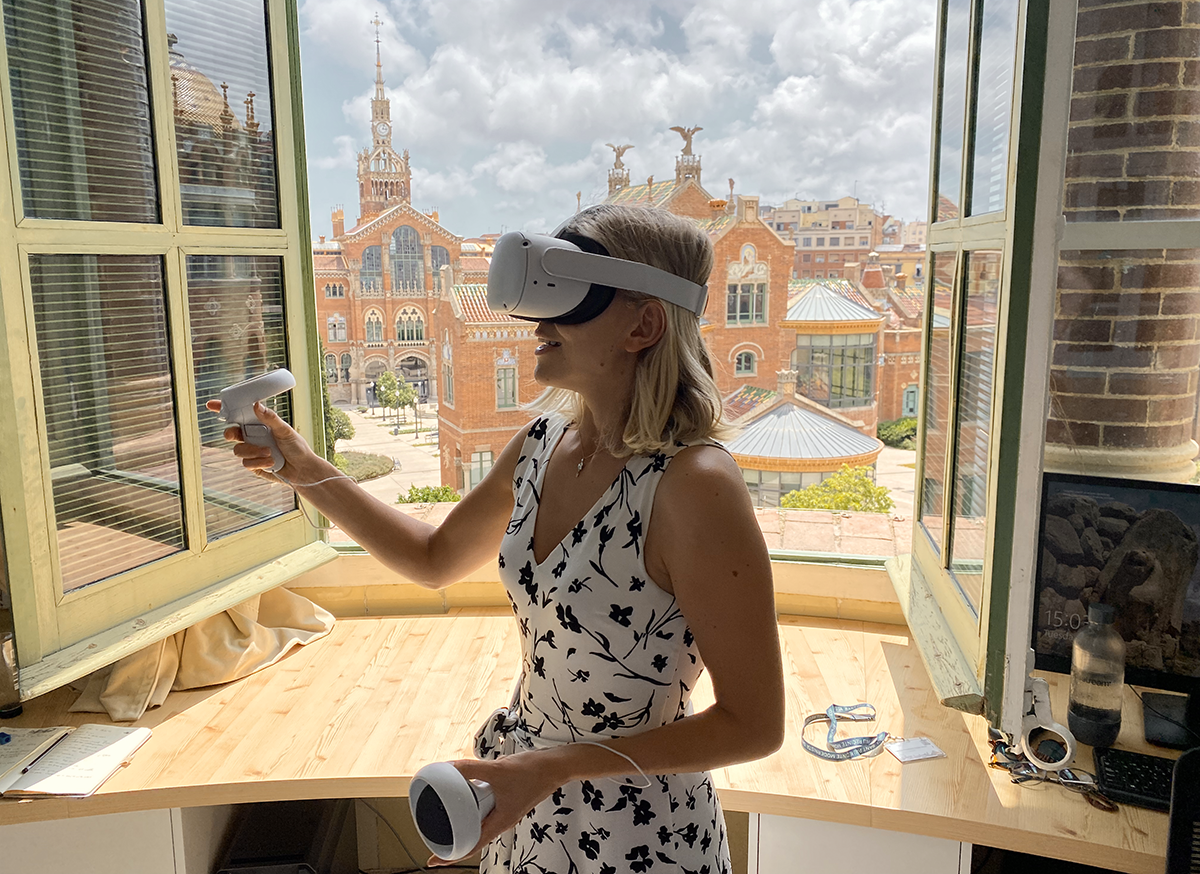“Our lack of ability to imagine the lived experience of someone else harms our society and our day to day lives.” – Charlie Pearmund
 Eva Haller Salon with Charlie PearmundMY HERO
Eva Haller Salon with Charlie PearmundMY HERO
Abigail Richardson talks to Eva Haller’s salon guest, Charlie Pearmund…
Charlie Pearmund is the CEO of Virtual Bodyworks, a company based in Barcelona who's mission is to use breakthroughs in neuroscience and Virtual Reality (VR) research to change society. Virtual Bodyworks has spent years researching and developing VR systems to create a more inclusive and fairer society.
Born in the UK in 1988, Charlie attended Eton College where he was President of the Eton Society before graduating with a BA Honors in Economics from Trinity College Dublin. He went on to work in investment banking but soon realized that he ‘needed a little bit more’ from his career. Not knowing what he wanted to do, but knowing he wanted to work in technology and with a business that had a ‘positive social impact,’ he returned to studying and embarked on an MBA at the IESE Business School in Barcelona. It was there that he was fortunate to discover Virtual Bodyworks.
On completing his MBA, Charlie was swiftly employed by the organization he had come to love and has subsequently implemented the world’s first stroke rehabilitation system based on VR embodiment as well as orchestrating projects relating to Diversity and Inclusion at Google Jigsaw and the World Bank. Today, Charlie and his colleagues continue to develop immersive training programs to further the company’s mission.
Colleagues include Mel Slater, the most published scientist in VR globally who won the Humboldt Research prize in 2021, and Maria V. Sanchez-Vives, one of Spain’s leading neuroscientists. The team has published more than 500 papers on virtual reality while collaborating with some of the world’s largest organizations around racial and gender bias, including the World Bank and the NHS.
 Virtual BodyworksVirtual Bodyworks
Virtual BodyworksVirtual Bodyworks
The History
Known predominantly as a relatively new technology originated for gaming, according to Slater and Sanchez-Vives, VR has a longer history:
VR started about 50 years ago in a form we would recognize today … although the hardware was completely different. In the 1980s and 1990s, VR emerged again based on a different generation of hardware (e.g., CRT displays rather than vector refresh, electromagnetic tracking instead of mechanical). This reached the attention of the public, and VR was hailed by many engineers, scientists, celebrities, and businesspeople as the beginning of a new era, when VR would soon change the world for the better. Then, VR disappeared from public view and was rumored to be “dead.” In the intervening 25 years a huge amount of research has nevertheless been carried out across a vast range of applications – from medicine to business, from psychotherapy to industry, from sports to travel.
Today, applications of VR are considered extensive and range across numerous domains of knowledge. And, although the most frequent uses in the near future will continue to be for games and entertainment, the possibilities to improve the lives for many sectors of the population in much more significant ways are endless.
In recent years, Virtual Bodyworks has deployed over €20m in European research funding to investigate the extent to which Virtual Reality can impact our behavior and improve our society. In a virtual salon with Eva Haller in February 2022, Charlie elucidated just exactly how the world of Virtual Reality has the power to do this.
Throughout the presentation, Charlie explained the psychology behind the technology, interjecting his talk with personal anecdotes, revealing impactful human behavioral issues:
Issue Number 1 – Bias and Exclusion. The first issue Charlie explored was the notion of bias. He divulged that being a redhead at school, he often found himself in the ‘minority’ regardless of his accomplishments and realized that this ‘physical attribute would always be judged first, before any talents I may have.' Later, when he joined the investment bank, he realized that he had become part of the ‘majority,’ - he was a ‘good fit.’ Thus demonstrating the perception “that bias determines who is a good fit and who is a bad fit,” who will ‘naturally’ be included and who will be excluded. We also heard that, according to a Harvard business review that studied 829 companies over 31 years discovered, “Even though there are organizations today that train businesses to create inclusive cultures, ‘Diversity and Inclusion Training’ (has) no positive effect in the average workplace, and in many cases training (often) worked to increase bias.”
Issue Number 2 – Empathy and Imagination – Charlie walked us through this concept, again, by sharing a personal story: having recently acquired a daughter through his marriage, Charlie explained how his life has changed significantly – not only does he now watch films about princesses, he also, more meaningfully, has come to realize that he is paying more attention and care to news stories involving parents and children. Caring more for children that he has never met, however, does not make him more empathetic, he explains, but it does help to describe the notion of empathy bias: ‘even the ‘good guys’ empathize more with those they share similarities. We humans “find it easier to identify with those we feel closer to, those that are a part of our tribe.”
The presentation also illuminated how the company uses its technology, based on the concept of embodiment, to make profound changes in behaviors in a multitude of settings. The first example was that of perpetrators of domestic violence.
Charlie stated that studies show that domestic violence abusers tend to have lower levels of empathy, as determined by an emotion recognition test, and that research proves that traditional empathy therapy fails in rehabilitating offenders in this field as the perpetrators do not have the imagination to put themselves in the victim’s position. This is where VR technology can be used as a solution. In a nutshell, the offender becomes the victim via a ‘virtual body’ and subsequently shares the experience of the abused, resulting in the ability to recognize fear, thus replacing imagination with actuality, resulting in an increase in empathy and, ultimately, subsequent re-offending reductions. Through the VR experience, the individual internalizes and physically experiences how another person feels, giving them perspective and increasing their cognitive empathy - unlike when they experience the situation as a 3rd person bystander: “This lived experience is what changes their behavior in a lasting way,” Charlie concluded.
And, according to Virtual Bodyworks’ research, there are many more scenarios in which the virtual world can result in creating a healthier, more inclusive, and fairer society. These include:
All of the above can be explored in the blogs and research papers on the website: www.virtualbodyworks.com.
In the subsequent MY HERO interview, we asked Charlie who he would consider his hero. He explained that his understanding of the term hero is that of a person who inspires others. (MY HERO agrees!) And that a personal hero is someone with whom one can identify. Hence, his childhood hero, he revealed, would have been a boy in the class above as, not only was he incredible at sport, he also had red hair. “But,” said Charlie, “I believe you can grow into your own hero – if you experience yourself becoming an ally or overcoming your fears in the VR world, you can, in turn, become your own hero.”
An example of this would be from a recent study that focused on individuals who experience social anxiety: The individual is placed in a virtual social setting within which, through an avatar who is speaking for them, they enjoy ‘successful conversations.’ The results have shown that by embodying a more confident self in the virtual world, the confidence of the individual is improved in the real world. “If you can make people feel, you can create changes; you can help people learn implicitly far faster than in a traditional learning setting – This is why VR is such a powerful tool for change,” concluded Charlie.
What is next for Virtual Bodyworks?
Said, Charlie:
While we believe that our diversity and inclusion training has the power to scale and extend across all companies and industries, we also recognize that we would benefit from targeting certain sectors first so that we can make the most impact on society as soon as possible. For us, the healthcare industry is of utmost importance because, quite simply, each of our lives depends on the quality of care that we receive. And, currently, this quality of care is inconsistent and unequal. For example, black women with breast cancer are 67% more likely to die from the disease than white women and studies have also shown that, ‘Black Women Five Times More Likely to Die from Pregnancy-Related Cardiomyopathy, Blood Pressure Disorders Than White Women.[iv]’
At Virtual Bodyworks, we are excited about the growth of virtual reality and virtual learning and believe more than ever that our history and mission are aligned to meet the future. Amid this growth, our in-depth research background, VR expertise, and scientifically-backed experiences demonstrate our unique position to influence bias in a way unseen before in virtual reality. Moreover, we know that we must stay current by creating engaging trainings that are refreshed to keep up with the speed of the industry’s growth. This is one of the reasons why, for example, we will be updating our scenarios and training curriculum regularly. The other reason we do this is because our research shows that bias and behavioral change happen over time, following repeated exposures.
To find out more:
References:
[i] https://www.virtualbodyworks.com/research-papers/putting-yourself-in-the-skin-of-a-black-avatar-reduces-implicit-racial-bias
[ii] https://blog.virtualbodyworks.com/products/convrself/
[iii] https://blog.virtualbodyworks.com/projects/fear-of-heights/
[iv] https://www.prb.org/resources/black-women-over-three-times-more-likely-to-die-in-pregnancy-postpartum-than-white-women-new-research-finds/
Page created on 4/4/2022 11:43:41 AM
Last edited 2/8/2023 6:15:06 PM
